英语必修三Unit 4 Astronomy课文翻译
人教2019新版英语新教材必修三 第四单元课文翻译

地球运行,其宇航员来自不同国家,空间站式
的人类能够持续在。持续在泰太空开展工作。
China’s space programme started later than those of Russia and the US, but it has made great progress in a short time. China became the third country in the world to independently send humans into space。
他们也十分希望发现能够维持生命 存在的其他行星。
Before the mid-20th century, most people felt travelling into space was an impossible dream. However, some scientists were determined to help humans realise their dream to explore space.
第四4单元 太空探索
Space: THE Falone? What’s out there?”Looking up at the stars, people have always wanted to learn more about space, and scientists work hard to find answers. They make vehicles to carry brave people into space to find out the secrets of the universe.
这是因为尽管风险巨大,人类还是坚信太空探 索极为重要。
高中英语必修3 Unit4 Astronomy the science of the stars-

Pluto
Pluto is so far away that the Sun is just a dim point of light that looks a lot like any other star. It is the smallest and most mysterious planet in our solar system. It has one moon, Charon, that is almost as big as the planet itself.
Jupiter
It has at least sixty-one moons and features the Great Red Spot, which is a huge "storm" that has been observed from here on Earth for over three hundred years. It is the largest planet in our solar system.
▪ draw a conclusion
Skills needed to be a scientist:
▪ accuracy ▪ a logical approach ▪ thorough writing of the experiment so
some on else could redo the experiment from your notes ▪ be able to draw conclusions from the evidence and not impose conclusions on the data
Unit 4 Astronomy:the science of the stars
高一英语人教课标必修3Unit 4 Astronomy the science of the stars

Astronomy:
the science of the stars
Astronomy is the scientific study of the universe and the heaven bodies (such as the sun, the moon, and stars), gas, and dust within it.
eight planets in the solar system
Pluto (冥王星),
good bye in 2006.
said
What are the names of the eight planets that circle our sun?
地球 火星 Earth Mars 天王星 Uranus
The Biblical Account "In the beginning God created the heavens and the earth. The earth was formless and empty, darkness was over the surface of the deep, and the spirit of God was hovering over the waters. And God said..." Day 1: God spoke and separated light from darkness. creating Day and Night. Day 2: God spoke and separated the water creating sky and ocean. Day 3: God spoke and created dry land. Day 4: Day 5: Day 6: man. Day 7: God spoke and created the sun, moon and stars. God spoke and created living in the air and sea. God spoke and created the land animals and God rested and blessed this day calling it Holy.
人教版高中英语必修三Unit4Astronomy:thescienceofthestars课文知识点解析
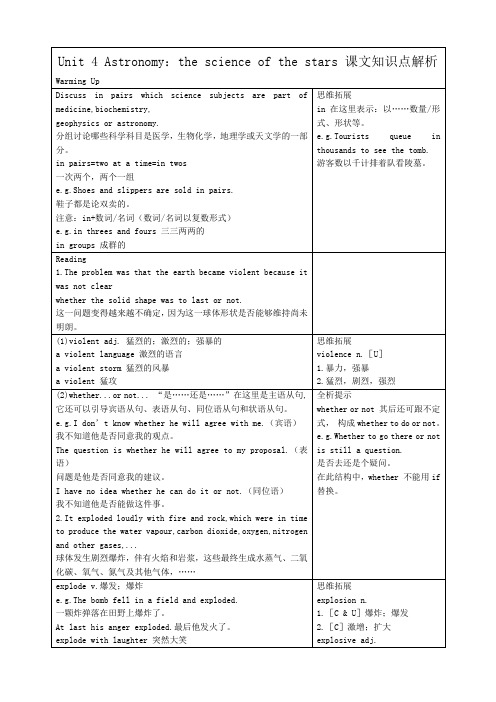
Unit 4 Astronomy:the science of the stars 课文知识点解析Warming UpDiscuss in pairs which science subjects are part of medicine,biochemistry,geophysics or astronomy.分组讨论哪些科学科目是医学,生物化学,地理学或天文学的一部分。
in pairs=two at a time=in twos一次两个,两个一组e.g.Shoes and slippers are sold in pairs.鞋子都是论双卖的。
注意:in+数词/名词(数词/名词以复数形式)e.g.in threes and fours 三三两两的in groups 成群的思维拓展in在这里表示:以……数量/形式、形状等。
e.g.Tourists queue in thousands to see the tomb. 游客数以千计排着队看陵墓。
Reading1.The problem was that the earth became violent because it was not clearwhether the solid shape was to last or not.这一问题变得越来越不确定,因为这一球体形状是否能够维持尚未明朗。
(1)violent adj. 猛烈的;激烈的;强暴的a violent language 激烈的语言a violent storm 猛烈的风暴a violent 猛攻思维拓展violence n.[U]1.暴力,强暴2.猛烈,剧烈,强烈(2)whether...or not... “是……还是……”在这里是主语从句,它还可以引导宾语从句、表语从句、同位语从句和状语从句。
e.g.I don’t know whether he will agree with me.(宾语)我不知道他是否同意我的观点。
课本单元讲解(含课文音频):必修三Unit4 Astronomy:the science of the stars

Unit4 Astronomy:the science of the stars常考单词、高频短语和写作句式Ⅰ. 常考单词必背1.harmful adj. 有害的It's harmful to your eyes to read books in the bus.在公共汽车上看书对你的眼睛有害。
[快速闪记](1)be in a puzzle 感到困惑;不知如何是好puzzle about/over 冥思苦想;苦苦思索(2)puzzling adj. 令人迷惑的puzzled adj. 感到迷惑的4.pull n. &vt. 拉(力);拖;牵引力She pulled his sleeve to get his attention.她拉拉他的袖子以引起他的注意。
[快速闪记]pull down 摧毁、推翻、拆除pull in 进站停靠;驶向路边(或某处)停靠pull out 离站;(使)摆脱困境pull through 恢复健康;渡过危机5.mass n. 质量;团;块;大量;(复)群众I have masses of work to do.我有大量工作要做。
Ⅱ. 高频短语必会1.in time 及时;终于Lucky for him,he was just in time for the bus.幸运的是,他及时赶上了公共汽车。
[快速闪记]on time 准时;按时at a time 一次;每次at one time 曾经;一度;同时at times 有时;偶尔at no time 决不in no time 马上;立刻2.give birth to 产生;分娩To our great joy,my sister-in-law gave birth to a baby boy.使我们大为高兴的是,我嫂子生了个男孩。
[快速闪记]at birth 出生时by birth 天生地;生来;在血统上3.in one's turn 轮到某人;接着When it was in my turn,I was too excited to speak.当轮到我时,我激动地都说不出话来了。
必修三unit4 Astronomy the science of stars
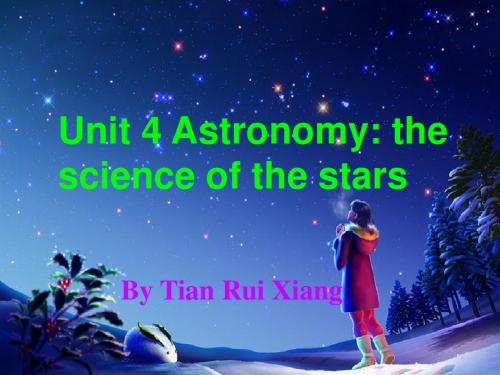
F 6. Then mraemptmileasls began to rise. T 7. At last, human beings came and spread all over
Unit 4 Astronomy: the science of the stars
By Tian Rui Xiang
Venus 金星 Earth 地球
Mars 火星
Mercury 水星
Jupiter 木星 Saturn 土星 Uranus 天王星
Neptune 海王星
The names of eight planets.
Let’s check your memory and understanding of the text!
(个人抢答竞赛)
Para. 2
What made up the earth atmosphere?
_c_a_r_b__o_n__, _n__i_tr_o__g_e_n_, _w__a_t_e_r__v_a_p__o_u_rand o_t_h__e_r_g__a_s_e_s_ made up the earth atmosphere.
1) 水星 2) 金星 3) 地球 4) 火星 5) 木星 6) 土星 7) 天王星 8) 海王星
• Mercury • Venus • Earth • Mars • Jupiter • Saturn • Uranus • Neptune
Reading : How Life Began on the Earth
appeared on the surface of water.
F 2. Then, the esxhterlelmfisehly&smfiashll plants developed. T 3. Next, green plants began to grow on land. F 4. Later, mraemptmileasls appeared for the first time. T 5. After that, dinosaurs developed, but they
英语必修三UnitAstronomy课文翻译
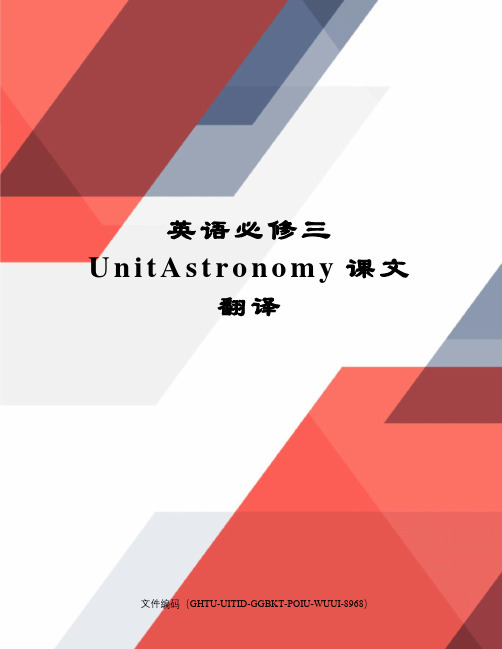
英语必修三U n i t A s t r o n o m y课文翻译文件编码(GHTU-UITID-GGBKT-POIU-WUUI-8968)英语必修三Unit 4 Astronomy课文翻译作者:未知来源:尚学苑 2014-09-20LIF HOW E BEGAN ON THE EARTHNo one knows exactly how the earth began, as it happened so long ago. However, according to a widely accepted theory, the universe began with a "Big Bang" that threw matter in all directions.After that, atoms began to form and combine to create stars and other bodies.For several billion years after the "Big Bang", the earth was still just a cloud of dust. What it was to become was uncertain until between 4.5 and 3.8 billion years ago when the dust settled into a solid globe. The earth became so violent that it was not clear whether the shape would last or not. It exploded loudly with fire and rock. They were in time to produce carbon, nitrogen, water vapour and other gases, which were to make the earths atmosphere. What is even more important is that as the earth cooled down, water began to appear on its surface.Water had also appeared on other planets like Mars but, unlike the earth, it had disappeared later. It was not immediately obvious that water was to be fundamental to the development of life. What many scientists believe is that the continued presence of water allowed the earth to dissolve harmful gases and acids into the oceans and seas. This produced a chain reaction, which made it possible for life to develop.Many millions of years later, the first extremely small plants began to appear on the surface of the water. They multiplied and filled the oceans and seas with oxygen, which encouraged the later development of early shellfishand all sorts of fish. Next, green plants began to grow on land. They were followed in time by land animals. Some were insects. Others, called amphibians, were able to live on land as well as in the water. Later when the plants grew into forests, reptiles appeared for the first time. They produced youngenerally by laying eggs. After that, some huge animals, called dinosaurs, developed. They laid eggs too and existed on the earth for more than 140million years. However,65 million years ago the age of the dinosaurs ended. Why they suddenly disappeared still remains a mystery. This disappearance made possible the rise of mammals on the earth. These animals were different from all life forms inthe past, because they gave birth to young baby animals and produced milk to feed them.Finally about 2.6 million years ago some small clever animals, now with hands and feet, appeared and spread all over the earth. Thus they have, intheir turn, become the most important animals on the planet. But they are not looking after the earth very well. They are putting too much carbon dioxideinto the atmosphere, which prevents heat from escaping from the earth into space. As a result of this, many scientists believe the earth may become toohot to live on. So whether life will continue on the earth for millions of years to come will depend on whether this problem can be solved.地球上生命的起源没有人确切知道地球是怎么样开始形成的,因为在很早很在以前地球就形成了。
(完整版)人教版高中英语必修三课文翻译_0

---------------------------------------------------------------最新资料推荐------------------------------------------------------人教版高中英语必修三课文翻译人教版高中英语必修三课文翻译人教版高中英语必修三课文翻译译篇一:人教版高中英语必修三课文翻译4-5 Unit 4 Astronomy:the science of the stars Reading 地球上生命的起源没有人确切知道地球是怎样开始形成的,因为在很早很早以前它就形成了。
然而,一种普通为人们所接受的理论是:宇宙起源于一次大爆炸,这次大爆炸将物质投射到四面八方。
然后,原子开始形成并结合成恒星和其他天体。
没有人确切知道地球是怎样开始形成的,因为在很早很早以前它就形成了。
然而,一种普通为人们所接受的理论是:宇宙起源于一次大爆炸,这次大爆炸将物质投射到四面八方。
然后,原子开始形成并结合成恒星和其他天体。
大爆炸后好几十亿年过去了,但地球还只是一团尘埃。
随后它会变成什么没人能知道,直到大爆炸后好几十亿年过去了,但地球还只是一团尘埃。
随后它会变成什么没人能知道,直到 38-45 亿年前,这团尘埃才慢慢地形成一个固体的球状物。
地球(开始)变得激烈动荡,不知道这个固体形状是否会继续存1/ 26在下去。
它(地球)猛烈的爆炸喷出了烈火与岩石。
最终产生了碳、氮气、水蒸气和其他多种气体,从而形成了地球的大气层。
更为重要的是,地球冷却了下来,地球的表面就开始出现了水。
亿年前,这团尘埃才慢慢地形成一个固体的球状物。
地球(开始)变得激烈动荡,不知道这个固体形状是否会继续存在下去。
它(地球)猛烈的爆炸喷出了烈火与岩石。
最终产生了碳、氮气、水蒸气和其他多种气体,从而形成了地球的大气层。
更为重要的是,地球冷却了下来,地球的表面就开始出现了水。
在火星这些其他行星上都出现了水,但和地球不同的是,这些水后来都消失了。
英语必修三Unit-4-Astronomy课文翻译

HOW LIFE BEGAN ON THE EARTH地球上生命的起源No one knows exactly how the earth began, as it happened so long ago. However, according to a widely accepted theory, the universe began with a "Big Bang" that threw matter in all directions.After that, atoms began to form and combine to create stars and other bodies.没有人确切知道地球是怎么样开始形成的,因为在很早很在以前地球就形成了。
然而,一种普遍为人们所接受的理论是:宇宙起源于一次大爆炸,这次大爆炸将物质投射到四面八方。
然后,原子开始形成并结合成恒星和其他天体。
For several billion years after the "Big Bang", the earth was still just a cloud of dust. What it was to become was uncertain until between 4.5 and 3.8 billion years ago when the dust settled into a solid globe. The earth became so violent that it was not clear whether the shape would last or not. It exploded loudly with fire and rock. They were in time to produce carbon, nitrogen, water vapour and other gases, which were to make the earths atmosphere. What is even more important is that as the earth cooled down, water began to appear on its surface.大爆炸后好几十亿年过去了,但地球还只是一团尘埃。
高中英语必修三:Unit4Astronomy_thescienceofthestars―人教标5
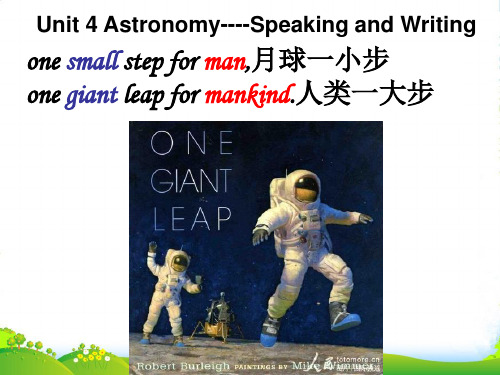
Example: What I find difficult is that we have no gravity on the moon. What I suggest is that we should…
Don’t forget to use the writing skills we have learnt in the last writing course.
I hope I can hear from you soon. Yours Sincerely, Kevin
What will you suggest that they should bring during the travel to the moon?
1T.hNeedeidffteorekneceepbweatwrme/efnullt…he earth and the moon:
Work in a group of four, and list(列出) on a piece of paper more than 5 items(物品) you think the family should bring with them during the travel to the moon.
A: What do you think they should bring on a space travel to the moon in order to stop them flying off the moon’s surface and into space? B: I think they should watch out for…so they’d better bring…which…/because…
21..NDeoeesdthtoe pmroootenchtayvoeutrheskgirnavity. What is it, 3co.Nmepeardedtowsittohpthyaot uoffrtohemefalrytihn?gWofhfatthdeomesothoant’smean s2u. Drfaocesetahendmionoton hsapvaectehe atmosphere as the 4ea.Nrtheeddoetso?stop your food floating away … 3. How will it influence the temperature on the moon?
英语必修三Unit 4 Astronomy课文翻译只是分享
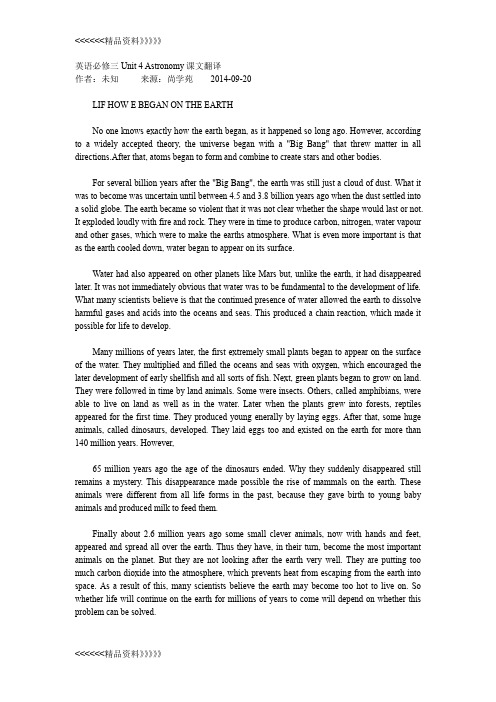
英语必修三Unit 4 Astronomy课文翻译作者:未知来源:尚学苑2014-09-20LIF HOW E BEGAN ON THE EARTHNo one knows exactly how the earth began, as it happened so long ago. However, according to a widely accepted theory, the universe began with a "Big Bang" that threw matter in all directions.After that, atoms began to form and combine to create stars and other bodies.For several billion years after the "Big Bang", the earth was still just a cloud of dust. What it was to become was uncertain until between 4.5 and 3.8 billion years ago when the dust settled into a solid globe. The earth became so violent that it was not clear whether the shape would last or not. It exploded loudly with fire and rock. They were in time to produce carbon, nitrogen, water vapour and other gases, which were to make the earths atmosphere. What is even more important is that as the earth cooled down, water began to appear on its surface.Water had also appeared on other planets like Mars but, unlike the earth, it had disappeared later. It was not immediately obvious that water was to be fundamental to the development of life. What many scientists believe is that the continued presence of water allowed the earth to dissolve harmful gases and acids into the oceans and seas. This produced a chain reaction, which made it possible for life to develop.Many millions of years later, the first extremely small plants began to appear on the surface of the water. They multiplied and filled the oceans and seas with oxygen, which encouraged the later development of early shellfish and all sorts of fish. Next, green plants began to grow on land. They were followed in time by land animals. Some were insects. Others, called amphibians, were able to live on land as well as in the water. Later when the plants grew into forests, reptiles appeared for the first time. They produced young enerally by laying eggs. After that, some huge animals, called dinosaurs, developed. They laid eggs too and existed on the earth for more than 140 million years. However,65 million years ago the age of the dinosaurs ended. Why they suddenly disappeared still remains a mystery. This disappearance made possible the rise of mammals on the earth. These animals were different from all life forms in the past, because they gave birth to young baby animals and produced milk to feed them.Finally about 2.6 million years ago some small clever animals, now with hands and feet, appeared and spread all over the earth. Thus they have, in their turn, become the most important animals on the planet. But they are not looking after the earth very well. They are putting too much carbon dioxide into the atmosphere, which prevents heat from escaping from the earth into space. As a result of this, many scientists believe the earth may become too hot to live on. So whether life will continue on the earth for millions of years to come will depend on whether this problem can be solved.地球上生命的起源没有人确切知道地球是怎么样开始形成的,因为在很早很在以前地球就形成了。
英语必修三Unit-Astronomy课文翻译
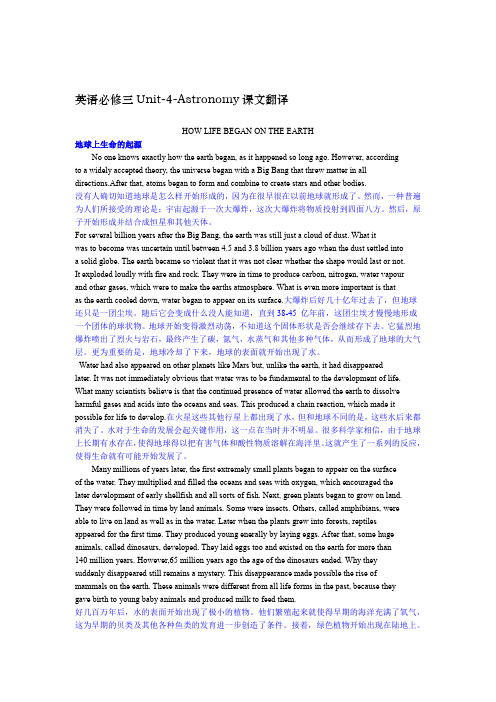
英语必修三Unit-4-Astronomy课文翻译HOW LIFE BEGAN ON THE EARTH地球上生命的起源No one knows exactly how the earth began, as it happened so long ago. However, accordingto a widely accepted theory, the universe began with a Big Bang that threw matter in alldirections.After that, atoms began to form and combine to create stars and other bodies.没有人确切知道地球是怎么样开始形成的,因为在很早很在以前地球就形成了。
然而,一种普遍为人们所接受的理论是:宇宙起源于一次大爆炸,这次大爆炸将物质投射到四面八方。
然后,原子开始形成并结合成恒星和其他天体。
For several billion years after the Big Bang, the earth was still just a cloud of dust. What itwas to become was uncertain until between 4.5 and 3.8 billion years ago when the dust settled intoa solid globe. The earth became so violent that it was not clear whether the shape would last or not.It exploded loudly with fire and rock. They were in time to produce carbon, nitrogen, water vapourand other gases, which were to make the earths atmosphere. What is even more important is thatas the earth cooled down, water began to appear on its surface.大爆炸后好几十亿年过去了,但地球还只是一团尘埃。
必修3-Unit4-Astronomy-the-science-of-the-stars词汇讲解
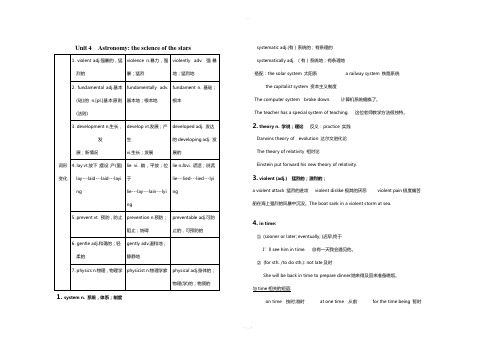
Unit 4 Astronomy: the science of the stars1. system n. 系统,体系;制度systematic adj.(有)系统的;有条理的systematically adj. (有)系统地;有条理地搭配:the solar system 太阳系 a railway system 铁路系统the capitalist system 资本主义制度The computer system broke down. 计算机系统瘫痪了。
The teacher has a special system of teaching. 这位老师教学方法很独特。
2.theory n. 学说;理论反义:practice 实践Darwins theory of evolution 达尔文进化论The theory of relativity 相对论Einstein put forward his new theory of relativity.3. violent (adj.) 猛烈的;激烈的;a violent attack 猛烈的进攻violent dislike极其的厌恶violent pain极度痛苦船在海上强烈的风暴中沉没。
The boat sank in a violent storm at sea.4. in time:①(sooner or later; eventually; )迟早,终于I’ll se e him in time. 总有一天我会遇见他。
②(for sth. /to do sth.): not late及时She will be back in time to prepare dinner.她来得及回来准备晚饭。
与time相关的短语:on time 按时;准时at one time 从前for the time being 暂时from time to time 不时地in no time 立刻,马上at times 有时at a time 每次;依次once upon a time 从前5. unlike ①prep. 不同;不像Unlike him, his son is tall.②adj. 不同的The sisters are quite unlike.unlikely adv. 未必的; 不太可能的; 注意与dislike “不喜欢”区分开来。
Unit-4-Astronomy-the-science-of-the-stars
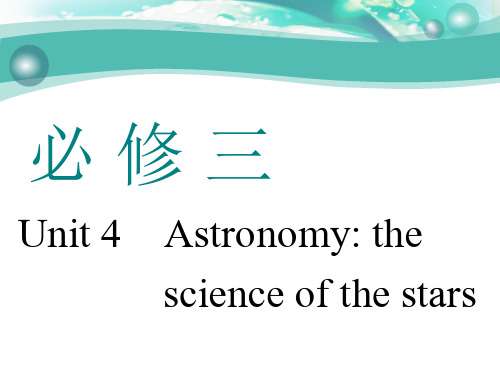
st night we had a discussion, which became more and more _v_io_l_e_n_t_. Finally we reached an agreement that we will never use violence whatever happens.(violent)
太阳系
14.carbon dioxide
二氧化碳
返回
Ⅱ.高频词汇(汉译英)
1. system n.
系统;体系;制度
2. religion n.
宗教;宗教信仰
3. theory n.
学说;理论
4. violent adj. 5. atmosphere n.
猛烈的;激烈的;强暴的 大气层;气氛
6. unlike prep.
返回
4.cheer up 感到高兴;感到振奋;(使)高兴;(使)振奋
(1)cheer sb. up cheer sb. on
(2)Cheers!
使某人振作起来 (比赛中)为某人喝彩;为某人加油 [口语](用于祝酒)干杯!
返回
5.puzzle n.谜;难题;(游戏的)猜谜 vt.& vi.(使)迷惑;(使)为难
8. pull n.& vt. 9. multiply vi.& vt.
拉(力);拖;牵引力 乘;增加
返回
拓展单词用活
[记全记牢]
1.religion n.宗教;宗教信仰→ religious adj.宗教的 2.theory n.学说;理论→theoretical adj.理论的;理论性的 3.violent adj.猛烈的;激烈的;强暴的→ violence n.暴
高一英语必修3-Unit-4-Astronomy-the-scien

高一英语必修3 Unit 4 Astronomy: the science of the stars人教试验版【本讲教化信息】一、教学内容必修3 Unit 4 Astronomy: the science of the stars(一)重点单词(二)重点短语(三)重(难)点句型二、学问精讲(一)重点单词1. system n.[c] 系统;体系;制度systematic adj.He created a new system of teaching foreign languages.他创建了一种新的外语教学体系。
The new system has had a disastrous effect on productivity.新制度对生产率产生了灾难性的影响。
Too much alcohol is bad for the system.过量饮酒对身体有害。
theory n.学说;理论theoretic adj.There are many theories about the origin of life.关于生命起源的学说有许多。
In this way they can better apply theory to practice.这样他们就能更好地把理论运用到实践中去。
Your plan sounds fine in theory it doesn’t work in practice.你的支配在理论上听起来不错,但在实践中无法实施。
2. violent adj. 猛烈的;激烈的;粗暴的violence n.They are launching a violent attack on the enemy.他们对敌人绽开了猛烈的进攻。
The class was shocked by his violent language.全班同学对他激烈的言辞感到震惊。
Children should not be allowed to watch violent movies.不应允许儿童看暴力电影。
- 1、下载文档前请自行甄别文档内容的完整性,平台不提供额外的编辑、内容补充、找答案等附加服务。
- 2、"仅部分预览"的文档,不可在线预览部分如存在完整性等问题,可反馈申请退款(可完整预览的文档不适用该条件!)。
- 3、如文档侵犯您的权益,请联系客服反馈,我们会尽快为您处理(人工客服工作时间:9:00-18:30)。
英语必修三Unit 4 Astronomy课文翻译作者:未知来源:尚学苑2014-09-20LIF HOW E BEGAN ON THE EARTHNo one knows exactly how the earth began, as it happened so long ago. However, according to a widely accepted theory, the universe began with a "Big Bang" that threw matter in all directions.After that, atoms began to form and combine to create stars and other bodies.For several billion years after the "Big Bang", the earth was still just a cloud of dust. What it was to become was uncertain until between 4.5 and 3.8 billion years ago when the dust settled into a solid globe. The earth became so violent that it was not clear whether the shape would last or not. It exploded loudly with fire and rock. They were in time to produce carbon, nitrogen, water vapour and other gases, which were to make the earths atmosphere. What is even more important is that as the earth cooled down, water began to appear on its surface.Water had also appeared on other planets like Mars but, unlike the earth, it had disappeared later. It was not immediately obvious that water was to be fundamental to the development of life. What many scientists believe is that the continued presence of water allowed the earth to dissolve harmful gases and acids into the oceans and seas. This produced a chain reaction, which made it possible for life to develop.Many millions of years later, the first extremely small plants began to appear on the surface of the water. They multiplied and filled the oceans and seas with oxygen, which encouraged the later development of early shellfish and all sorts of fish. Next, green plants began to grow on land. They were followed in time by land animals. Some were insects. Others, called amphibians, were able to live on land as well as in the water. Later when the plants grew into forests, reptiles appeared for the first time. They produced young enerally by laying eggs. After that, some huge animals, called dinosaurs, developed. They laid eggs too and existed on the earth for more than 140 million years. However,65 million years ago the age of the dinosaurs ended. Why they suddenly disappeared still remains a mystery. This disappearance made possible the rise of mammals on the earth. These animals were different from all life forms in the past, because they gave birth to young baby animals and produced milk to feed them.Finally about 2.6 million years ago some small clever animals, now with hands and feet, appeared and spread all over the earth. Thus they have, in their turn, become the most important animals on the planet. But they are not looking after the earth very well. They are putting too much carbon dioxide into the atmosphere, which prevents heat from escaping from the earth into space. As a result of this, many scientists believe the earth may become too hot to live on. So whether life will continue on the earth for millions of years to come will depend on whether this problem can be solved.地球上生命的起源没有人确切知道地球是怎么样开始形成的,因为在很早很在以前地球就形成了。
然而,一种普遍为人们所接受的理论是:宇宙起源于一次大爆炸,这次大爆炸将物质投射到四面八方。
然后,原子开始形成并结合成恒星和其他天体。
大爆炸后好几十亿年过去了,但地球还只是一团尘埃。
随后它会变成什么没人能知道,直到38-45 亿年前,这团尘埃才慢慢地形成一个团体的球状物。
地球开始变得激烈动荡,不知道这个固体形状是否会继续存下去。
它猛烈地爆炸喷出了烈火与岩石,最终产生了碳,氮气,水蒸气和其他多种气体,从而形成了地球的大气层。
更为重要的是,地球冷却了下来,地球的表面就开始出现了水。
在火星这些其他行星上都出现了水,但和地球不同的是,这些水后来都消失了。
水对于生命的发展会起关键作用,这一点在当时并不明显。
很多科学家相信,由于地球上长期有水存在,使得地球得以把有害气体和酸性物质溶解在海洋里。
这就产生了一系列的反应,使得生命就有可能开始发展了。
好几百万年后,水的表面开始出现了极小的植物。
他们繁殖起来就使得早期的海洋充满了氧气,这为早期的贝类及其他各种鱼类的发育进一步创造了条件。
接着,绿色植物开始出现在陆地上。
随后,陆地上出现了动物,其中有一些是昆虫,另外一些叫两栖动物,他们既能在陆地上生活,也能在海里生存。
后来,当植物长大成了森林的时候,爬行动物出现了。
他们一般是通过孵蛋而繁衍后代的。
再后来一些叫做恐龙的巨型动物出现了。
他们也生蛋,在地球上生存了一亿四千多万年。
然而,六千五百万年前,恐龙时代结束了。
他们为什么会突然灭绝至今仍是个谜。
恐龙的灭绝使地球上哺乳动物的产生有了可能。
这些动物不同于以往所有的生物形式,因为他们能从体内生产出幼崽并给幼崽哺乳。
最后,大约260万年前,一些小巧聪明,长着手脚的动物出现了,他们散布在地球的各个地方。
于是,他们接着成为这个行星上最重要的动物。
然而,他们对地球却不怎么在意,他们把过多的二氧化氮释放到大气层中,这使得地球上的热不能释放到太空中去。
地球可能因此变得太热而不适合生物生存。
所以,在未来数百万年中,生命能否在地球上延续,取决于这个问题能否得到解决。
A VISIT TO THE MOONLast month I was lucky enough to have a chance to make a trip into space with my friend Li Yanping, an astronomer. We visited the moon in our spaceship! Before we left, Li Yanping explained to me that the force of gravity would change three times on our journey and that the first change would be the most powerful. Then we were off. As the rocket rose into the air, we were pushed back into our seats because we were trying to escape the pull of the earths gravity. It was so hard that we could not say anything to each other. Gradually the weight lessened and I was able to talk to him. "Why is the spaceship not falling back to the earth? On the earth if I fall from a tree I will fall to the ground." I asked. "We are too far from the earth now to feel its pull," he explained, "so we feel as if there is no gravity at all. When we get closer to the moon, we shall feel its gravitypulling us, but it will not be as strong a pull as the earths." I cheered up immediately and floated weightlessly around in our spaceship cabin watching the earth become smaller and the moon larger.When we got there, I wanted to explore immediately. "Come on," I said. "If you are right, my mass will be less than on the earth because the moon is smaller and I will be able to move more freely. I might even grow taller if I stay here long enough. I shall certainly weigh less!" I laughed and climbed down the steps from the spaceship. But when I tried to step forward, I found I was carried twice as far as on the earth and fell over. "Oh dear," I cried, "walking does need a bit of practice now that gravity has changed." After a while I got the hang of it and we began to enjoy ourselves.Leaving the moons gravity was not as painful as leaving the earths. But returning to the earth was very frightening. We watched, amazed as fire broke out on the outside of the spaceship as the earths gravity increased. Again we were pushed hard into our seats as we came back to land. "That was very exhausting but very exciting too," I said. "Now I know much more about gravity! Do you think we could visit some stars next time?" "Of course," he smiled, "which star would you like to go to?"月球之旅我的朋友李彦平是一位宇航员。
